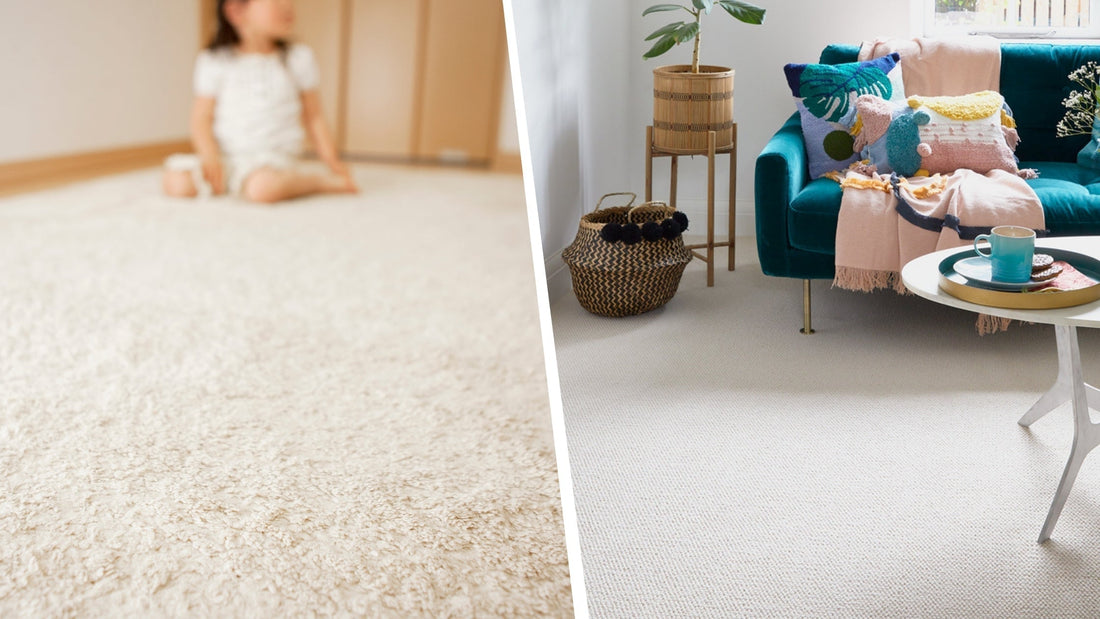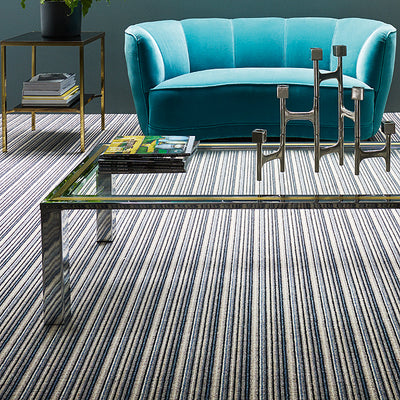
Polypropylene vs Wool Carpets: Which is Best for Your Home?
Quick Links
Why is Polypropylene So Popular in the UK?
Pros and Cons of Polypropylene Carpets
When choosing the perfect carpet for your home, there are a number of options when it comes to the fibres of the carpet. In this blog we compare the two extremes, on one side is the natural wool fibre and one the other is the man made polypropylene fibre. Each material offers distinct advantages, and understanding the differences can help you make the best choice for your lifestyle, budget, and design preferences. In this in-depth guide, we’ll explore everything from durability and comfort to stain resistance and cost, so you can make an informed decision.
What is Polypropylene Carpet?
Polypropylene, also known as olefin, is a synthetic fibre commonly used in carpet manufacturing. In recent years, it has become one of the most popular carpet materials in the UK, with a growing number of homeowners opting for it due to its excellent balance of price, practicality, and easy clean properties.
Why is Polypropylene So Popular in the UK?
Polypropylene has carved out a strong position in the UK carpet market thanks to a number of key factors:
-
Affordability: As a synthetic fibre, polypropylene is significantly cheaper to produce than natural alternatives like wool. This makes it an attractive option for first-time buyers, landlords, or anyone furnishing a home on a budget.
-
Stain Resistance: British homes often deal with muddy boots, pets, and unpredictable weather. Polypropylene’s inherent stain resistance makes it a sensible option for everyday messes.
-
Family-Friendly: With a soft texture and low cost, polypropylene is often chosen for children’s bedrooms, playrooms, and family living areas where spills and wear are inevitable.
-
Wide Range of Styles: Polypropylene carpets come in countless colours and patterns, easily matching modern and traditional home aesthetics.

Pros and Cons of Polypropylene Carpets
Pros:
-
Good Stain Resistance: The fibres are non-porous, meaning liquids sit on top of the carpet and can be cleaned up easily.
-
Fade Resistance: Unlike some natural fibres, polypropylene holds its colour well even in sunlit rooms.
-
Budget-Friendly: It’s one of the most affordable carpet materials available.
-
Low Maintenance: Vacuuming and occasional spot cleaning are generally sufficient.
-
Hypoallergenic: Less likely to trap allergens compared to deeper pile natural carpets.
Cons:
-
Durability: While suitable for general domestic use, polypropylene carpets tend to wear down faster in high-traffic areas.
-
Heat Sensitivity: The synthetic fibres can melt if exposed to high heat, such as from a dropped iron or fireplace embers.
-
Appearance: May lack the depth and richness of natural fibres; can look less premium.
-
Static Build-Up: Tends to generate more static electricity, which can attract dust and pet hair.
What is Wool Carpet?
Wool is a natural fibre obtained from sheep and has been a staple in carpet manufacturing for centuries. It’s associated with quality, comfort, and a more sustainable approach to home furnishings.

Why Choose Wool Carpets?
Wool remains the go-to option for those who want a luxurious and long-lasting flooring solution:
-
Natural Insulation: Wool retains warmth and reduces noise, making it ideal for bedrooms and lounges.
-
Long-Term Durability: It’s naturally elastic, allowing the fibres to bounce back and resist crushing.
-
Sustainability: A renewable, biodegradable resource that supports eco-conscious living.
-
Visual and Textural Appeal: The unique natural crimp of wool adds depth and richness to its texture.
Pros and Cons of Wool Carpets
Pros:
-
Superior Comfort: Soft, warm, and comfortable underfoot.
-
Durability: Can last for decades when properly cared for.
-
Eco-Friendly: Renewable, biodegradable, and sustainable.
-
Flame Retardant: Naturally resistant to fire without needing chemical treatments.
-
Natural Insulation: Keeps rooms warmer in winter and cooler in summer.
Cons:
-
Expensive: Wool carpets are an investment, often costing significantly more than synthetic options.
-
Stain Susceptibility: More prone to permanent staining from spills and dirt.
-
Maintenance-Heavy: Requires regular professional cleaning to stay in top condition.
-
Allergenic Potential: Can trap dust and allergens if not cleaned thoroughly.
Comparing Polypropylene and Wool Carpets
|
Feature |
Polypropylene |
Wool |
|
Price |
Very affordable |
Premium price |
|
Durability |
Moderate (5–10 years) |
High (10–25 years) |
|
Stain Resistance |
Excellent |
Fair |
|
Maintenance |
Easy to clean |
Requires specialist care |
|
Eco-Friendliness |
Not biodegradable or renewable |
Fully natural and sustainable |
|
Comfort |
Fairly soft |
Extremely soft and warm |
|
Appearance |
May look synthetic |
Rich texture and natural variation |
|
Fire Resistance |
Can melt or scorch |
Naturally flame-resistant |
|
Best Use Areas |
Children’s rooms, rentals, hallways |
Living rooms, bedrooms, luxury spaces |
Best Use Cases
-
Polypropylene: Ideal for high-use areas such as hallways, playrooms, rental properties, and budget refurbishments. Also great for households with children or pets where easy cleaning is a priority.
-
Wool: Best suited to master bedrooms, lounges, and formal settings where luxury, comfort, and a longer lifespan are important. Ideal for homeowners seeking a natural, sustainable flooring solution.
Final Thoughts
Choosing between polypropylene and wool carpets ultimately comes down to balancing budget, lifestyle, and design preferences. Polypropylene carpets have surged in popularity across the UK thanks to their affordability, stain resistance, and family-friendly practicality. Meanwhile, wool carpets continue to appeal to those prioritising long-term value, natural materials, and premium comfort.
If you're looking for a cost-effective, low-maintenance carpet that still looks great, polypropylene is an excellent option. If, however, you're investing in a long-term feature for your home and value sustainability and texture, wool might be worth the splurge.
For a wide range of both polypropylene and wool carpets, visit Carpets-Online.co.uk – where quality meets choice, and expert advice is just a click away.







